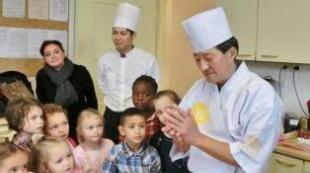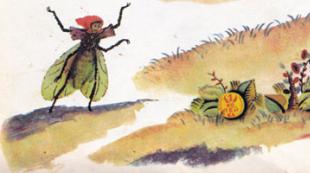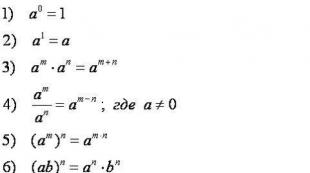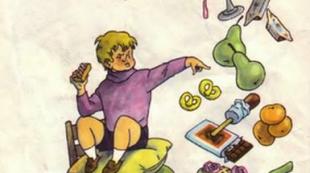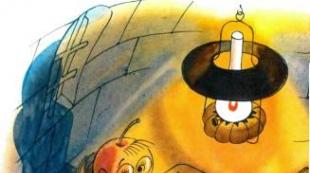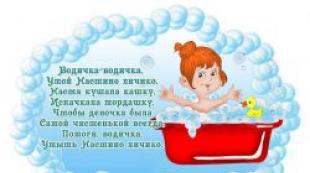The value of pedagogical culture. Professional and pedagogical culture of the teacher. The main qualities of a teacher
Pedagogical culture is an essential component, a component of the general culture of a teacher, characterizing the degree of depth and thoroughness of his mastery of knowledge of pedagogical theory in its constant development, the ability to apply this knowledge independently, methodologically soundly and with high efficiency in the pedagogical process, taking into account the individual-typical characteristics of students, their interests and inextricably linked with the development of science and practice.
(V.A. Slastenin) To understand the essence of professional pedagogical culture, it is necessary to keep in mind the following provisions that reveal the connection between general and professional culture, its specific features:
Professional pedagogical culture is a universal characteristic of pedagogical reality, manifested in different forms existence;
Professional pedagogical culture is an internalized general culture and performs the function of a specific projection of a general culture in the sphere of pedagogical activity;
Professional pedagogical culture is a systemic education that includes a number of structural and functional components, which has its own organization, selectively interacts with the environment and has the integrative property of a whole, not reducible to the properties of individual parts;
The unit of analysis of professional and pedagogical culture is pedagogical activity, creative in nature;
The peculiarities of the implementation and formation of the teacher's professional and pedagogical culture are determined by the individual, creative, psychophysiological and age characteristics, the prevailing social and pedagogical experience of the individual.
Taking into account the above methodological foundations makes it possible to substantiate a model of professional pedagogical culture, the constituent components of which are axiological, technological and personal and creative.
Axiological component professional pedagogical culture is formed by a set of pedagogical values created by mankind and peculiarly included in the integral pedagogical process at the present stage of education development.
Pedagogical values are norms that regulate pedagogical activity and act as a cognitively acting system that serves as a mediating and connecting link between the existing social worldview in the field of education and the activities of a teacher. They, like other values, have a syntagmatic character, i.e. are formed historically and are recorded in pedagogical science as a form of social consciousness in the form of specific images and ideas. The mastery of pedagogical values occurs in the process of carrying out pedagogical activities, in the course of which their subjectivation takes place. It is the level of subjectivation of pedagogical values that serves as an indicator of the teacher's personal and professional development.
Pedagogical values differ in level of their existence, which can become the basis for their classification. On this basis, personal, group and social pedagogical values are distinguished.
Socio-pedagogical values reflect the nature and content of those values that function in various social systems, manifested in public consciousness. It is a set of ideas, perceptions, norms, rules, traditions that regulate the activities of society in the field of education.
Group pedagogical values can be presented in the form of ideas, concepts, norms that regulate and guide pedagogical activity within the framework of certain educational institutions. The set of such values is holistic in nature, has relative stability and repeatability.
Personal and pedagogical values act as socio-psychological formations, which reflect the goals, motives, ideals, attitudes and other worldview characteristics of the teacher's personality, which in their totality make up the system of his value orientations. Axiological "I" as a system of value orientations contains not only cognitive, but also emotional-volitional components that play the role of its internal reference point. It assimilates both socio-pedagogical and professional-group values, which serve as the basis for the individual-personal system of pedagogical values.... This system includes:
values, associated with the assertion by the individual of his role in the social and professional environment (the social significance of the work of a teacher, the prestige of pedagogical activity, recognition of the profession by the closest personal environment, etc.);
values, satisfying the need for communication and expanding its circle (communication with children, colleagues, reference people, the experience of children's love and affection, the exchange of spiritual values, etc.);
values, focusing on self-development of creative individuality (opportunities for the development of professional and creative abilities, familiarization with world culture, engaging in a favorite subject, constant self-improvement, etc.);
values, allowing for self-realization (creative, variable nature of the teacher's work, the romance and fascination of the teaching profession, the possibility of helping socially disadvantaged children, etc.);
values, making it possible to satisfy pragmatic needs (the possibility of obtaining a guaranteed civil service, remuneration and duration of leave, career growth, etc.).
Among the named pedagogical values, one can single out the values self-contained and instrumental types , differing in subject content. Self-sufficient values - this is values-goals , including the creative nature of the teacher's work, prestige, social significance, responsibility to the state, the possibility of self-affirmation, love and affection for children. Values of this type serve as the basis for the development of the personality of both teachers and students. Values-goals act as the dominant axiological function in the system of other pedagogical values, since goals reflect the main meaning of the teacher's activity.
Searching for ways to realize the goals of pedagogical activity, the teacher chooses his own professional strategy, the content of which is the development of himself and others. Consequently, the values-goals reflect the state educational policy and the level of development of pedagogical science itself, which, being subjectivized, become significant factors of pedagogical activity and affect the instrumental values, called values-means. They are formed as a result of mastering the theory, methodology and pedagogical technologies, forming the basis of the teacher's professional education.
Values-Means- these are three interconnected subsystems: pedagogical actions proper, aimed at solving vocational educational and personal developmental problems (technologies of teaching and upbringing); communicative actions that allow to implement personally and professionally oriented tasks (communication technologies); actions reflecting the subjective essence of the teacher, which are integrative in nature, since they combine all three subsystems of actions into a single axiological function. Values-means are subdivided into such groups as values-relations, values-qualities and values-knowledge.
Values-relationships provide the teacher with an expedient and adequate construction of the pedagogical process and interaction with its subjects. The attitude to professional activity does not remain unchanged and varies depending on the success of the teacher's actions, on the extent to which his professional and personal needs are satisfied. The value attitude towards pedagogical activity, which sets the way of interaction between a teacher and students, is distinguished by a humanistic orientation. In value relations, self-attitudes are equally significant, i.e. the teacher's attitude to himself as a professional and a person.
In the hierarchy of pedagogical values, the highest rank is given to values-qualities
, since it is in them that the essential personal and professional characteristics of the teacher are manifested or exist. These include diverse and interrelated individual, personal, status-role and professional-activity qualities. These qualities are derived from the level of development of a number of abilities: predictive, communicative, creative (creative), empathic, intellectual, reflective and interactive.
Values-attitudes and values-qualities may not provide the necessary level of implementation of pedagogical activity, if one more subsystem is not formed and assimilated - a subsystem values-knowledge
... It includes not only psychological, pedagogical and subject knowledge, but also the degree of their awareness, the ability to select and evaluate them on the basis of a conceptual personal model of pedagogical activity.
The teacher's mastering of fundamental psychological and pedagogical knowledge creates conditions for creativity, alternativeness in the organization of the educational process, allows you to navigate in professional information, track the most significant and solve pedagogical problems at the level of modern theory and technology, using productive creative methods of pedagogical thinking.
Thus, the named groups of pedagogical values, generating each other, form axiological model, which has a syncretic character. It manifests itself in the fact that values-goals determine values-means, and values-relations depend on values-goals and values-qualities, etc. they function as a whole.
The axiological wealth of the teacher determines the effectiveness and purposefulness of the selection and increment of new values, their transition into motives of behavior and pedagogical actions.
Technological component pedagogical culture includes the methods and techniques of the teacher's pedagogical activity. Educational activity is technologically advanced in nature. In this regard, an operational analysis of pedagogical activity is required, which allows us to consider it as a solution to various pedagogical problems. These include a set of analytical-reflexive, constructive-prognostic, organizational-activity, evaluative-informational, correctional-regulating tasks, the methods and methods of solving which constitute the technology of the teacher's professional and pedagogical culture.
This component of the teacher's culture is characterized by the degree of his awareness of the need to develop the entire spectrum of his own pedagogical abilities, as a guarantee of the success of his professional activity, preventing possible pedagogical errors, as well as the meaningfulness of the most rational ways of developing pedagogical abilities. The culture of pedagogical activity is formed in the process of practical work through a more detailed development and creative application of the achievements of special, psychological, pedagogical, social and humanitarian sciences and advanced experience. The elements of the teacher's activity culture are usually:
Knowledge and skills in the content, methodology and organization of educational work;
Pedagogical thinking;
pedagogical skills (gnostic, perceptual, constructive, projective, communicative, expressive, organizational);
pedagogical technique;
pedagogical self-regulation.
Culture of pedagogical thinking includes the development of the ability for pedagogical analysis and synthesis, the development of such qualities of thinking as criticality, independence, breadth, flexibility, activity, speed, observation, pedagogical memory, creative imagination. The culture of pedagogical thinking implies the development of the teacher's thinking at three levels:
At the level of methodological thinking, guided by his pedagogical beliefs. Methodological thinking allows the teacher to adhere to the correct guidelines in their professional activities, to develop a humanistic strategy;
The second level of pedagogical thinking is tactical thinking, which allows the teacher to materialize pedagogical ideas in the technology of the pedagogical process;
The third level (operational thinking) is manifested in the independent creative application of general pedagogical laws to particular, unique phenomena of real pedagogical reality.
Pedagogical technique- a set of techniques used by the teacher for the most effective achievement of the goals of the educational process. The concept of pedagogical technique includes three groups of techniques:
a) techniques for managing oneself (facial expressions, managing emotions, mood, creating creative well-being, managing attention, observation, imagination; speech technique (breathing, voice production, diction, speech rate);
b) be able to manage others - organizational, communicative, technological methods of making demands, managing pedagogical communication, organizing collective creative affairs;
c) be able to cooperate. The technology of establishing pedagogically expedient relationships requires a certain instrumentation of pedagogical requirements, reliance on the public opinion of the collective, adequate assessments of knowledge, skills, skills, as well as the behavior of students and the teacher's personality itself as a factor that has a direct impact on the nature of emerging relationships in a particular activity.
Personal and creative component pedagogical culture is manifested in the self-realization of the essential forces of the teacher - his needs, abilities, character traits, temperament and other personal characteristics in pedagogical activity. The process of teacher's self-realization consists of a number of interrelated stages, such as self-knowledge, self-esteem, self-regulation, self-affirmation, which reveal the intellectual, professional and moral potential of the teacher's personality.
Professional identity, from on the one hand, it provides psychological self-control of the individual, thus maintaining the clarity and intensity of the teacher's intellect, on the other hand, it contributes to the social determinism of creative pedagogical activity. In the second case, the subject of creativity compares his goals, attitudes, means with the norms and values of his social group, society as a whole, which were assigned to him and thanks to which he became a creative person. Since individual self-awareness presupposes self-regulation and self-control, it acts as a condition for the conscious development of the creative powers and abilities of the individual. The teacher's self-awareness not only contributes to the formation of an integrative professional image, but also influences the solution of individual professional problems associated with the implementation of his creative potential.
The success of self-realization as a free activity of the individual is determined by the nature of the goal and the measure of its personal understanding and acceptance. Socially significant goals of the professional activity of a university teacher should be accepted in whole or in part, becoming personally significant, subjective. Awareness of the goals of one's professional activity, an active-positive emotional-value attitude towards it contribute to the actualization of the personal professional and pedagogical qualities of a teacher, create conditions for constant self-knowledge and self-esteem, self-reflection, self-development, self-affirmation as mechanisms of creative self-realization.
Self-knowledge and self-esteem are in dialectical unity with self-realization. In the process of creative activity, self-knowledge and the formation of an emotional attitude of the individual to himself take place; a new level of self-knowledge and self-attitude acts as an incentive to carry out professional and pedagogical activities at the level of personal and semantic activity, the essence of which is the desire to test oneself, to realize one's abilities (intellectual, moral, communicative, etc.). Self-knowledge as a process of a person revealing his needs, abilities, interests for himself accompanies a person throughout his life. Self-observation, introspection and self-reflection that make it up do not depend on the age, experience, qualifications of a person. A beginner or even an experienced university teacher does not always understand his personal and professional characteristics. The problem of modeling one's own personality structure as an end, means and result of self-knowledge and self-realization arises. The modeling and implementation of the professional self testifies to the professional growth and development of the teacher's personality, his creative abilities in the implementation of pedagogical activities. Creative self-knowledge is inseparable from the world, since, on the one hand, while creating, a person knows himself as a part of the reality in which he lives and creates, and on the other, knowing himself, a person also cognizes the surrounding reality, discovering and developing new creative possibilities.
Self-reflection as an intrapersonal moment of self-realization of a teacher aimed at the perception and comprehension of educational situations from the student's point of view to take it into account own behavior, on the knowledge of ways of solving analytical-reflexive, constructive-prognostic, organizational-activity, evaluative-informational and correctional-regulatory tasks. Self-reflection helps to present the student not only as an object, but also as a subject of the pedagogical process, to understand the essence of subject-subject relations.
The ability for continuous professional and personal self-development through the maximum possible implementation of their creative powers is one of the most important criteria for the personality of a teacher as a professional. Self-development serves as a way of constant personal and creative enrichment with pedagogical values, new technologies of pedagogical activity. An innovative style of activity, a willingness to systematize, generalize their own experience and the experience of their colleagues are becoming the most important characteristics of the creative activity of a higher school teacher.
We regard self-realization as a condition for the manifestation of the essential forces of a professional, and the ability to do it is an important element of the culture of the individual. The measure of personal self-realization of creative possibilities is, in our opinion, the essence of professional and pedagogical culture.
The personal and creative component of pedagogical culture reveals the mechanism of mastering it and its embodiment as a creative act.
The most important prerequisite for creative activity is the ability to distinguish one's professional self from the surrounding pedagogical reality, to oppose oneself as a subject to the objects of one's influence and to reflect on one's actions, words and thoughts.
It is in pedagogical activity that the contradictions of the creative self-realization of the individual are revealed and resolved, the cardinal contradiction between the pedagogical experience accumulated by society and the specific forms of its individual and creative appropriation and development, the contradiction between the level of development of the strength and abilities of the individual and self-denial, overcoming this development, etc. Thus, pedagogical creativity is a type of human activity, the universal characteristic of which is pedagogical culture. Pedagogical creativity requires from the teacher an adequate need, special abilities, individual freedom, independence and responsibility.
The following main criteria and indicators of the formation of pedagogical culture can be distinguished.
1. The value attitude towards pedagogical activity is manifested through a set of indicators such as understanding and assessing the goals and objectives of pedagogical activity, awareness of the value of pedagogical knowledge, recognition of the value of subjective relations, satisfaction with pedagogical work.
2. Technological and pedagogical readiness presupposes knowledge of methods for solving analytical-reflexive, constructive-prognostic, organizational-activity, evaluative-informational and correctional-regulating pedagogical tasks and the ability to use these methods.
3. The creative activity of the teacher's personality, which manifests itself in intellectual activity, pedagogical intuition and improvisation.
4. The degree of development of pedagogical thinking as a criterion of Professional pedagogical culture contains the following indicators: the formation of pedagogical reflection, a positive attitude towards ordinary pedagogical consciousness, the problem-seeking nature of activity, flexibility and variability of thinking, independence in decision-making.
5. The desire for professional and pedagogical improvement of a university teacher is made up of the following indicators: an attitude towards professional and pedagogical improvement, the presence of a personal pedagogical system, a keen attitude to the experience of one's colleagues, mastering ways of self-improvement.
It becomes obvious that pedagogical culture is the sphere of creative application and realization of the pedagogical abilities of a teacher.
Education is one of the most important parts of the cultural system of society.
The education system is essential sociocultural regulator of the development of society where, one way or another, all social groups of the population are involved.
Educational culture , as the most important part of the culture of society as a whole (national, regional), at each critical historical period is determined by the dominance a certain educational paradigm, i.e. systems of exemplary theoretical, methodological and value attitudes shared by the majority of the intellectual elite of society. Its significant characteristics are both general civilizational (belonging, for example, to the Orthodox-Russian cultural world) and mental ("spiritually stationary") foundations of being.
The design (and re-design) of the educational paradigm should fully meet the existing specifics of the region: its socio-economic, ethno-confessional, demographic and other components.
Only harmonious combination (balance) stabilizing the role of the educational component of spiritual culture (in terms of continuity and transmission of socio-cultural experience from generation to generation, translation of cultural norms and values, patterns of behavior and thinking) and innovative(in line with continuous restructuring and qualitative renewal, modernization of the knowledge system) - remains the main task of education. Any deviation, bias immediately entails either routinization and stagnation of the educational process, or general destabilization, fraught with destruction cultural core of society.
In general, the history of culture is history changes in socio-cultural models of education, or through their gradual reform (in response to changing socio-economic conditions), or as a result of radical revolutionary transformations. Our centuries-old domestic cultural and historical experience has included both of these types. Unlike the West with its well-known conservatism, the domestic education system, as well as culture as a whole, was characterized by historical “crossroads”, “forks” with a situation of choice, with the search for new ways and projects for further development.
Pedagogical culture - a part of the general culture, in which the spiritual and material values, as well as the methods of creative pedagogical activity, necessary for mankind to serve the historical process of generational change and the socialization of the individual, are most reflected.
Pedagogical culture can be considered as communication of 2 individuals at different moments of the transmission of human culture (cultural theory of dialogue):
· The phenomenon of pedagogical culture in dialogue is considered as: "I" in "them" and "You" in "I";
· Creation of the pedagogical world as an environment for spiritual, intellectual, aesthetic development of subjects of pedagogical interaction;
· Opening a personality for oneself in another personality.
IN structure of pedagogical culture are included pedagogical position and professional and personal qualities teacher. A pedagogical position is a certain moral choice that a teacher makes. The pedagogical position includes the ideological and behavioral aspects, attitude to pedagogical work, moral qualities, humanism, objectivism, social activity, citizenship.
Pedagogical culture is determined by not so much the availability of knowledge as the attitude towards them, which is determined by the level of thinking(criticality of consciousness, problem-variative understanding of situations).
Pedagogical culture- this is:
· Harmony of development of intellectual and organizational qualities;
· High pedagogical skills and organization in activities;
· Ability to combine teaching and educational work with the search for ways to improve it;
· Broad outlook, psychological and pedagogical erudition and competence;
· A set of personal qualities important in teaching and educational work.
The culture of the educator includes:
· Transfer of knowledge, skills and abilities to students, contributing to the formation of their worldview;
· Development of intellectual capabilities and abilities, emotional-volitional and effective-practical spheres of the psyche;
· Strengthening the health of children;
· Formation of an aesthetic attitude to reality;
· Ensuring the conscious assimilation of students of moral principles and skills of behavior in society.
One of the vocabulary meanings of the concept of "culture" is the level of development of spiritual and material values, abilities, opportunities, achieved results that meet the specifics and requirements of pedagogical work. This is what they mean when they usually talk about professional culture in general or pedagogical culture in particular.
Pedagogical culture - the highest degree of correspondence of personality development and professional readiness of the teacher to specificity pedagogical activity. it personally mediated pedagogical professionalism, allowing to carry out pedagogical activity at the highest level of its social, humane, moral, pedagogical, scientific and special criteria proper. It is rightly said that teaching work is not a profession, but a vocation in life. Truly cultured and professional is only the one for whom such work has become a personal need, the satisfaction of which brings the highest joy, and achievements - a feeling of satisfaction, outside of which the teacher cannot think of himself. The striving to master and implement the indicators of pedagogical culture in deeds should be inherent in every teacher, because otherwise he does not give his students, even in some way deforms them, not fulfilling not only professional, but also human duty. One can imagine what an "educated teacher" will do with his students with triplets in his diploma. This is about the same as going under the knife of a certified surgeon-grade three.
There are many definitions of pedagogical culture, but mostly they are only variants of the same thing. In practice, they only divide, name and structure its numerous components in different ways (there are definitions containing up to 30 basic and hundreds of detailed elements). Speaking about the main thing, one can imagine pedagogical culture as including five main components of the personality and preparedness of the teacher, forming a systemic unity and meeting both general and special requirements of pedagogical work (Fig. 11.1).
Fig. 11.1.
Pedagogical orientation of the personality- the teacher's motivation system, which determines the irrepressible attractiveness of pedagogical activity and the full involvement of all forces and abilities in it. A teacher with a high culture refers to pedagogical activity not as work, profession, but as a life vocation, civic responsibility, lifestyle, his life and professional position, and hence his enthusiasm, passion, dedication. As the religious scriptures say: "Where your treasure is, there your heart will be." For a professionally educated teacher to do something is not professional enough, "dirty", carelessly - this is first of all not respecting oneself, poisoning one's conscience. As the Ukrainian philosopher G. Skovoroda (1722-1794) rightly noted: “What can be more harmful than a person who has knowledge of the most complex sciences, but does not have a good heart? He will use all his knowledge for evil. " The pedagogical orientation is inherent in:
- socially mature, scientifically correct, progressive, creative concept of activity- spiritual, civilized, humane, democratic pedagogical credo, pedagogical worldview;
- pedagogical purposefulness - love for a person, disinterested striving to help him become a full-fledged and successful person in life with all his might; an active civic position of a participant in the creation in Russia of a civilized, truly humane, democratic, legal state and a moral society, as well as preparing the younger generation for such participation;
- pedagogical fullness aspirations and activities that ensure the unity of upbringing, education, training and development of people: "Without participation in educational work, the entire pedagogical culture, all the knowledge of the teacher is dead baggage", a professional teacher cannot be someone who limits his pedagogical contribution only to the formal conduct of classes , teaching and, withdrawing from the upbringing, education and development of students, does not take into account the interests educational institution and his teaching staff, maybe, but does not want to help a colleague who sees shortcomings and ways to eliminate them, but believes that “this is not my business;
- pedagogical interests - to the human problems of the life of society and the activities of the state, to each person, his life, the future, preparing him for them, helping in it, scientific and effective implementation of activities;
- pedagogical passion and affection - passionate, enthusiastic, with full dedication to work; irrepressible striving to achieve its maximum efficiency, intolerance to everything that reduces it, constant search, pedagogical optimism, tireless work on oneself; lifelong attachment to teaching work. Even realizing that it is impossible to achieve everything, he tries with all his might to sow good, light, eternal, fights against human injustice, immorality, stupidity;
- pedagogical disinterestedness - benevolent, enthusiastic, difficult work with people at the call of the heart and without mercantile personal monetary prudence; his benefits are not a priority for him, and from the outside he may even look like an idealist, a person “out of this world”. This position captivates many, especially young people, who feel a touch to the pure source of human spirituality, which involuntarily evokes respect, awakens reflections on their own life position, a sense of faith in the actual existence of high human values and impulses to imitate. Genuine teaching is somewhat akin to asceticism, especially in modern conditions.
B.S. Gershunsky writes about the teacher: “... this thinker, feeling the fullness of the sacred responsibility entrusted to him for the fate of the trusted and entrusted Man, for his spirituality, intelligence and physical health, for the future of his country and the entire World, the entire human civilization. "
In the pedagogical orientation - the main indicators of the teacher's upbringing, the main motivating forces of his selfless work. The low level of its formation and instability is a deep and uncompensated source of weak results in activities, indifference to professional subtleties, a formal bureaucratic approach to pedagogical duty. Such a teacher is not a teacher, but a functionary in the educational process, not so much useful as harmful for him.

IN AND. Zagvyazinsky
Pedagogical ability associated with the development of both general and special professionally important qualities and abilities. To educate people, to educate them, to teach, to develop is an activity not for mediocre people, but for smart people, thinking, seeking, active people.
A person who does not have the ability to do this simply does not have the right to work with people, he cannot be allowed to her. The works of F.I. Gonobolina, N.V. Kuzmina,
V.A. Krutetsky, A.I. Shcherbakova, I. V. Strakhova,
N. D. Levitova, V.A. Kan-Kalika, V.A. Slastenin,
IN AND. Zagvyazinsky and others. The development of the teacher's abilities is associated with:
- overall ability to pedagogical work- successful mastery of it, high performance in it and continuous progressive growth in its implementation;
- humanism, democracy and collectivism as specially developed qualities that are constantly manifested in behavior and style of work;
- educational, didactic, organizational skills ",
- developed intellect, attention, speech, rhetoric, culture of speech, resourcefulness, readiness for improvisation ", the teacher, in principle, must be an intelligent person;
- creativity - a sense of the new, a penchant for creativity, a willingness to grounded and scientifically correct and tested in formative experiments innovations (while denying innovations, a number of innovations, pedagogical projection, adventurism and avant-gardeism), independence, the ability to critically evaluate and re-evaluate the accumulated experience in the conditions of the rapid development of sciences, technology, technology, social relations and the rejection of everything really
tarevshi (AS Makarenko noted: "Creative work is possible only when a person treats work with love, when he consciously sees joy in it, understands the benefits and necessity of work, when work is done for him as the main form of manifestation of personality and talent" );
- erudition;
- developed pedagogical, associated with it psychological and pedagogical thinking and special, related to the taught academic discipline;
- increased empathy(ability to empathize) reflexivity(the ability to put oneself in the place of another and understand how he thinks, as well as mentally imagine how he looks in the eyes of others), tolerance;
- sociability, culture of communication and pedagogical behavior, psychological and pedagogical tact;
- artistry "
- strong-willed qualities - activity, initiative, dedication, perseverance, organization, discipline, accuracy, self-control, the ability to self-mobilize;
- high efficiency, overload resistance;
- the need for self-improvement.
Educational abilities are associated with the teacher's love for children and interest in working with people, his attractiveness for them, exemplary behavior in personal behavior, fairness, sociability, availability, openness, listening skills, endurance, patience, perseverance, memory for faces, names and other data about them, the habit of seeing the reasons in oneself, etc. Didactic abilities are determined by intelligence, interest in teaching, general development of thinking and its consistency, consistency, clarity, psychological and pedagogical nature, speech culture, psychological and pedagogical observation, etc.
Pronounced pedagogical abilities in a person indicate the presence of pedagogical endowments, pedagogical talent. They say about this: "He is a teacher from God."
Pedagogical excellence - knowledge, skills and abilities in the organization and construction of pedagogical systems and processes inherent in pedagogical activity. Its basis is basic pedagogical education(at the level of education) - detailed and versatile human knowledge, knowledge of general pedagogy, orientation in pedagogical work, knowledge scientific foundations him, corresponding
bibliography, periodicals available in current publications on the problems of pedagogical activity and recommendations for its implementation. This is fundamental orientation in the pedagogical problems of society, social and pedagogical dependencies of pedagogical activity, modern requirements for education and education, understanding of the specifics of work in the pedagogical collective. Modern pedagogical skills are inconceivable without social and pedagogical competence.
Pedagogical excellence presupposes: the ability to skillfully apply all recommendations, pedagogical experience, methods and techniques of education, training and development; the ability to translate into decisions and actions pedagogical principles, requirements of regulatory documents, general guidelines for work in the methodology of a particular lesson, event, pedagogical action; possession of private didactics of teaching an academic discipline; the ability to conduct all forms of training, perform all types of methodological work, carry out creative methodological search and pedagogical experimentation; possession of pedagogical techniques (the technique of using speech and non-speech means, technologies, methods of pedagogical observation, analysis, influence, establishing contact, etc.), the skill of pedagogical interaction, pedagogical tact, methodological skill, creative pedagogical skills.
Special Craftsmanship - competence in the direction of pedagogical activity in which the teacher specializes. It can be any specialization: subject, socio-pedagogical, engineering-pedagogical, according to the levels of education, etc. It presupposes a good knowledge of the content of the academic discipline, its connection with others, the logic of breaking down into sections and topics, good memorization of their content, skills and abilities on a private methodology of teaching and action, scientific preparedness, knowledge of new science related to the studied content, research experience and activity. This knowledge is obligatory for a teacher of a higher school who has transferred from practice to it, and cannot be exhausted by practical experience. The teacher, the instructor should always know a lot more than he tells the students, be convinced of what is being told and remember everything well. Only in this case his speech will be logical, free, bright, imaginative, and he will be able to observe the audience, people and their reactions, maneuver content, awaken and hold interest, and his speech will acquire expressiveness, persuasiveness, imagery without artistic efforts.
The culture of personal pedagogical work - skills and habits of the teacher correctly and fully use free from work and occupation 436
time for self-improvement and preparation for the next events. This time is the main one in his self-improvement. The culture of such work is formed from the culture of planning and a thrifty attitude to free time, constant monitoring of the novelties of pedagogical experience, science, life of society, continuous work on the accumulation, storage and systematization of information, working (educational) and scientific materials (clippings, copies, folders, files, filing cabinets, etc.), preparation of publications; hygiene of mental work.
The teacher must teach, continuously learning, working on himself. According to legend, Aristotle said to Alexander the Great: “There is no royal way in science,” the same can be said about mastering pedagogical culture. The success of each individual lesson, event conducted by the teacher, 80% depends on the systematic work to enrich and improve oneself, and only 20% - on the direct preparation for it the day before.
All components of pedagogical culture are interconnected and condition each other.
Educators, like other professionals and specialists, differ in the level of pedagogical culture - varying degrees of compliance with the requirements of pedagogical activity. Pedagogical practice even gave rise to a special proverb: "All lecturers are divided into three groups: one cannot be listened to, the second is allowed, and the third cannot be ignored." According to the data of diagnostic examinations of working teachers, four levels of culture are distinguished:
- highest professional - he has the characteristics described above that are available to the teacher;
- average professional - cultural indicators are close to those characteristic of the highest level, but still in many respects still differ from it;
- low (elementary) professional - typical for novice teachers ("young teacher", "inexperienced teacher") who have received preliminary pedagogical training (education); this level is usually observed in the first three years of work;
- pre-professional - is characterized by the fact that a person engaged in pedagogical work only gleaned from personal experience of teaching in secondary and higher school ideas about what an activity is, how to conduct it, what are the features of a seminar, how a teacher behaves, etc. having numerous gaps, inaccuracies and even errors; they are similar to the knowledge of the modern detective film lover who is 437
He thinks that he knows how an investigator, an operative, a judge, a lawyer works, and believes that he could already work in their place. But with such knowledge (they are typical for practitioners who go to work in universities without pedagogical retraining), it is impossible to carry out full-fledged pedagogical activities and often reach the heights of pedagogical culture even in 10-20 years of teaching.
Conducted in the late 1990s. qualification studies of the level of pedagogical culture in five universities have shown that only 9% of the number of faculty members have the highest level. This testifies to the huge reserves for improving the training of teachers by increasing the level of pedagogical culture of all of them.
The pedagogical culture of a particular teacher can be assessed as a whole and for each of the components - pedagogical orientation, pedagogical abilities, etc. This is useful for the development of individualized programs for its improvement, assistance and competitions for filling positions.
- V.A. Sukhomlinsky Wise collective power. M., 1975.S. 87.
- Gershunsky BS Philosophy of education for the XXI century. P. 6.
- Korzhuev A.V., Popkov V.A., Ryazanova E.D. Reflection and critical thinking in the context of tasks higher education// Pedagogy. 2002. No. 1. S. 18-22.
- Makarenko A.S. Compositions. Moscow: APN RSFSR, 1957.T. IV. P. 396.
A teacher or educator is a person who, through his personality, sets an example for students. The successful teaching of children, their upbringing and knowledge of the subject directly depend on the personal qualities of the teacher. In turn, they are a component of pedagogical culture. In this article, we will look at this phenomenon, as well as its components.
Definition of a scientific term
Many believe that pedagogical culture is a characteristic of a teacher's personality, considered in the process of educational and educational activities. And no one will argue with that.
In pedagogy, there is a similar term for the characteristic of a teacher - "psychological and pedagogical culture." It means a degree of professionalism.
A teacher for every child is a role model. Such a person should work a lot on his personality, since his main task is to transfer various knowledge at a qualitative level. In addition, he must be able to instill in children a love for their subject, profession, school or university, and, finally, for the Motherland.
Personal qualities of a teacher
Considering the pedagogical culture, one should also study the personal qualities that a teacher should have. First of all, they are associated with high morality, erudition, and intelligence. After all, a professional teacher, regardless of external factors, is always friendly to students.

High culture can be traced in the consistent and logical behavior of the teacher. He deeply analyzes the actions of each of the students and, of course, believes in their strengths and abilities. In general, the professional qualities of a teacher include certain aspects. These include:
- love for children and for work;
- honesty;
- tact;
- culture of speech;
- benevolence;
- dedication;
- curiosity;
- adherence to principles.
The presence of such traits in the character of a teacher precisely determines his level of culture, as well as the ability to influence the educational process.
The professional qualities of a teacher provide for the predisposition of a given person to teaching and educational activities, as well as the ability to achieve set goals. But without a rich erudition, a broad outlook, as well as patience, benevolence, the ability for self-improvement and dedication, the teacher in his work will not be able to achieve these goals.

As you know, even perfect knowledge of a subject is not enough for a teacher. He must also be able to clearly and interestingly present his knowledge in the subject. This is also one of the indispensable aspects of his professionalism.
The process of forming a pedagogical culture should begin with the first lecture at the university, while the improvement of skills and abilities should take place from the first to the last day of teaching experience.
The basics of all the basics
Let's take another look at the common components of pedagogical culture. They include:
- the teacher's sense of tact;
- the ability to express your thoughts;
- knowledge of teaching techniques;
- general erudition;
- decent appearance.
Below we will look at each component in more detail.

Tact
Pedagogical tact is the teacher's ability to correctly express their requests, as well as requirements. A good teacher may demand that a variety of assignments be done in a soft tone. In addition, he knows how to give an order in the form of a request.
A high pedagogical culture also provides for the ability to listen carefully to your interlocutor, regardless of his personality. The teacher should be able to talk with both a boy and a girl, with both an adult and a child. He knows how to tactfully listen to his interlocutor, even if his statement is incorrect. Without rudeness and sarcasm, he will voice his opinion.

A culture of speech
Purity of speech is also an important component of pedagogical culture. For a teacher, the main thing should be the ability to communicate not only with children, but also with their parents. The teaching profession is in the category "person - person". Without the skills of competently expressing one's thoughts, as well as without correctly formalizing them, one cannot count on success in a teaching career.
The main components of speech pedagogical culture are verbal and non-verbal communication. Verbal, that is, verbal communication, is helped by the following qualities:
- Purity of speech, presupposing the observance of not only grammatical, but also stylistic, as well as orthoepic norms of the language.
- Expressiveness during utterance. The teacher should speak not only with expression, but also with the correct intonation.
- Volume. The teacher needs to speak at a volume that will suit the audience. You don't need to speak too loudly, but you shouldn't whisper either.
- Richness of speech. The teacher's statements should be filled with synonyms, phraseological units, aphorisms, sayings, and also proverbs.
As you can see, pedagogical culture is a whole set of skills that is improved only during practice.
It is customary to refer to non-verbal culture as gestures, postures, touches, and facial expressions. The teacher should feel good about his body, be able to own it, that is, be able to demonstrate that he is open to students, which means that he is waiting for their answer or listens carefully to them. A competent and tactful teacher is able to show the student at one glance that he is wrong.

Erudition
We are moving on to the next component - this is erudition. A talented teacher is well erudite. He has a developed outlook. He is able to answer all questions on his subject, and can also tell a lot of interesting things that are not related to his field of activity. In order for erudition to develop, it is necessary to read not only fiction, but also popular science literature, to follow the events in the country and in the world.
There are times when children test their teachers, that is, they ask teachers tricky questions. And it often happens that the teacher cannot find the answer. In such situations, the teacher, unfortunately, can lose the respect of his charges.
Pedagogical technologies
As you can see, the teaching technique is organized from many components. And this set includes the ability to master behavior, voice, facial expressions, as well as to correctly build relationships with pupils.
But, in addition to this, pedagogical technique also includes the ability to empathize with others and bring out creativity in children. A talented teacher easily organizes collective activities. If he has a good command of pedagogical technique, then he encourages collective creativity in the classroom, and also supports democratic self-government in it.
This skill can be improved not only by teaching in the classroom, but also by performing special psychological exercises at home in front of a mirror.
Thus, pedagogical culture is also the attitude of the teacher to his person, including interest in the educational process, introspection, as well as the growth of professionalism.
Appearance
The appearance of a teacher is an important component of cultural pedagogical activity. It includes not only the ability to dress, but also to look as required by the position. The teacher will be a role model if he is neat and tidy, wears elegant clothes, and also uses minimal amounts of cosmetics.
Remember your attitude towards teachers who did not pay enough attention to their own appearance. Often they caused us to neglect ourselves and their subject.
And since we are talking about the appearance of the teacher, it should be added that the teacher must also be confident in himself. Not only should children respect his personality, but so should he.
Functions of the teacher
From the components of culture, we move on to the functions that the teacher performs. There are also a lot of them:
- Translation of knowledge, skills and abilities.
- Formation of the point of view of students.
- Broadening the horizons of children.
- Formation and development of conscious behavior of students in modern society.
- Development of the aesthetic taste and preferences of each child.
- Maintenance and development of his mental and physical health.

Finally
Pedagogical culture is a number of important qualities and special skills that a teacher must perfectly possess in order to successfully implement his educational activities. Throughout his life, a teacher must work on himself, improve his skills and abilities, and also improve his own culture on a daily basis.
In our article, we examined the foundations of pedagogical culture. We hope this article answered your questions on this topic.
Pedagogical culture is an essential characteristic of the teacher's personality, the methods of his pedagogical activity and the values that he is guided by in it. The level of culture of a society can be judged by the attitude of society towards children. The state and development of pedagogical culture is influenced by many factors, including the country's economy, information culture, moral culture, religious (spiritual) culture, and national culture.
There are 4 aspects of pedagogical culture:
The area of relations between adults and children as a sphere of human practice, a way of transferring life experience and national cultural values;
The area of pedagogical knowledge, including a certain system of pedagogical values, pedagogical theory, pedagogical thinking, experience of creative activity, in which the cumulative spiritual experience in the field of education and upbringing is integrated;
The sphere of professional activity, including professional knowledge, skills, etc .;
Personal characteristics of each teacher, his positions, qualities, behavior.
The structure of pedagogical culture:
1. Culture goal setting manifests itself in a certain development strategy of the pedagogical society, and in the development of programs of a lower level.
2. Culture pedagogical knowledge- includes the foundation of the accumulated experience, the presence of scientific theories and hypotheses.
3. Worldview culture, its level largely determines the process and result of the relationship between teacher and students.
4. Culture thinking, in the process of an individual's life, it is formed both by ordinary means and by special ones.
5. Culture feelings associated with the development of skills to love, empathize, be proud, ashamed, tormented, etc. with the development of the widest range of higher experiences, without which the communication and work of the educator does not bear good fruit. Its manifestation is also the ability to express qualified judgments of a moral, aesthetic, political, legal, religious or philosophical nature. Evaluation as the subject's attitude to reality has a different nature than the relationship in the process of cognition, knowledge is biased, and evaluation is subjective. But this subjectivity does not appear as a form of arbitrariness, but only reflects the position taken by the subject in his relation to someone or something.
6. Culture communication teachers with students, their parents, etc.
7. Organizational a culture that allows for the provision of education and upbringing processes at various levels. The teacher must himself possess the skills of an organizer and pass them on to the student.
Taken as a whole, pedagogical culture can be represented as:
1) subject-productive;
2) technical and technological.
All the achievements of society in the field of pedagogical work are related to the subject-productive culture. Techno-technological culture includes methods, means, methods by which the results are obtained. And since no stage or cycle of this activity can be delineated, then any specific pedagogical phenomenon acts, on the one hand, as a means of applying a certain method, and on the other, as a way to obtain a new result.
As a result, we have 2 types of pedagogical values:
1) the results of culture;
2) methods, technologies for their production.
The carriers of pedagogical culture (teachers, parents) exist within the framework of a certain cultural and historical society, therefore they differ markedly in the degree of mastering the values of the pedagogical treasury. It depends on many reasons. The qualification of a teacher determines the result of education. The pedagogical failure of the majority of parents in our society is especially evident. Here, worldview primitivism, the lack of special knowledge and skills, and the inability to feel brightly and think competently make themselves felt.
It is difficult to say where the low level of pedagogical culture is more dangerous: in the family or in an educational institution. In any case, our society today needs to raise the level of pedagogical culture.
3. Professional culture of the teacher.
Professional pedagogical culture is an integral quality of the teacher's personality, which projects his general culture, with the pedagogical profession. This is a synthesis of high professionalism and internal qualities of a teacher, mastery of teaching methods and the presence of cultural and creative abilities. It is a measure of creative appropriation and transformation of the experience accumulated by humanity. A teacher who has a pedagogical culture, has a well-developed pedagogical thinking and consciousness, has a creative potential.
1. Culture pedagogical thinking- based on a deep theoretical understanding of both pedagogical and social reality. This is the awareness of the principles of the development of the pedagogical process, the prediction of the results of professional activity. Characteristics of pedagogical thinking: flexibility, alternativeness, creativity.
2. Culture pedagogical work presupposes high level possession of professional skills and abilities, the ability to be creative. Pedagogical activity is a creative process, since each teacher has an individuality, then the culture of pedagogical work is purely individual.
3. Culture creativity of the teacher- involves the use of the entire set of theoretical knowledge and practical skills, finding a new problem in an outwardly familiar situation and finding ways to solve it, looking for new ways to solve new pedagogical problems.
4. Culture pedagogical communication- meaningful development of the norms of the teacher's relationship with everyone around him. Guided by these norms, the teacher corrects his emotions, will, personal manifestations of character, etc.
5. Culture speeches associated with the culture of communication.
Expressive speech abilities of a primary school teacher
The teacher's word is the most important tool for influencing children, therefore, the following are put forward for the teacher's speech the requirements:
a) consistency in form and content;
b) correctness (phonetics, grammar);
c) emotional expressiveness;
d) richness of vocabulary, etc.
